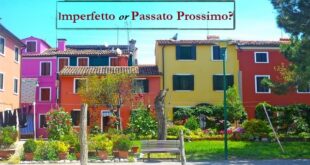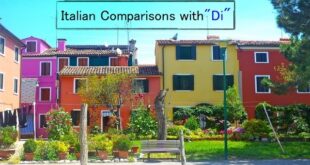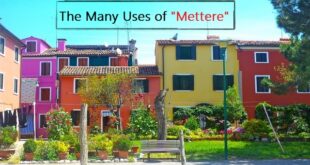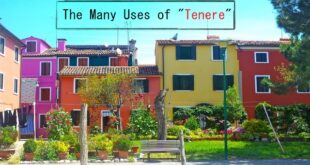Imperfetto or Passato Prossimo? Previous blogs in this series have discussed the basics of how to conjugate and use the imperfetto and the passato prossimo to speak about the recent past.* As we’ve mentioned before, the conjugation of these verb forms is fairly straightforward; the tricky part is knowing which past tense to choose to describe a particular event. To make matters more complex, a compound sentence can be created using only the imperfetto, only the passato prossimo, or a combination of both. And in many situations, the same event can be described in Italian using either the imperfetto …
Read More »Italian Preposition “a” or “in”?
The Italian “a” can be translated as both “to” or “in” in English. The Italian “in” is translated the same as in English — “in”! Both prepositions “a“ and “in“ can be used to describe where someone is going and where a person of thing is located. But each preposition has its own particular role to play to fulfill this function. If we learn how to use the Italian prepositions “a” and “in” correctly, we will truly sound like a native Italian!” Use the Italian “a” or “in” for a Country, Region, or City Americans and Italians use the prepositions …
Read More »Making Reservations in Italian
Prior to beginning the lesson for this blog, I acknowledge that in the larger cities of Italy it is not usually necessary to make reservations in Italian; the Italian staff usually speak basic English and often the languages of their European neighbors — French, Spanish or German. Also, of course, in most cases, reservations can now be made over the internet on one’s computer or smart phone, without any human interaction at all! But I’ve found that a few phrases in Italian are always warmly welcomed by Italian servers and hotel receptionists, even in the larger cities, and can serve …
Read More »Comparisons using “di”
To speak fluently in another language, it is important to know how to make comparisons. Every day we all compare the characteristics of one thing to another — larger vs. smaller, older vs. younger, better vs. worse — often while describing what we prefer. The Italian language uses precise sentence structures and specific prepositions when making comparisons that are not always identical to English. In this blog, we will explore several ways to make comparisons that use the Italian preposition di. The good news is that Italian is consistent, and it is easy to learn the “Italian way” of thinking …
Read More »The many uses of mettere
The Italian verb mettere and its reflexive counterpart mettersi are used in many colloquial expressions in Italy today. It is important to “put in” the time to learn how to use mettere, both literally and figuratively, if one wants to speak Italian like a native! The Italian verb mettere is most often translated into English as “to put” or “to place.” It can be used in a simple way, to describe moving an object from one place to another. Mettere is commonly used with the prepositions a, da, in and su in many Italian expressions that have the connotation of “putting” …
Read More »How to use “di” in Italian
To speak fluently in another language, it is important to know how to introduce an object or to describe direction, location or time. We do this naturally in our own language with prepositions — short words like of, to, at/in/from, and by. All languages use prepositions but the choice of preposition in a given situation will differ from one language to another. This is the case for English and Italian; English and Italian often use prepositions in a different way. Also, in some situations Italian sentence structure may require a preposition where English does not! Let’s take a look at …
Read More »Italian phrases for dating
Today in America, we “date,” “go out on a date,” or refer to two people who are “dating,” from the first romantic encounter until they become married. After marriage, a couple can still go out on “date nights.” But be careful when translating American romantic experiences into Italian! The English verb “to date” as used in America today to refer to a romantic relationship does not have a literal translation in Italian. Of course, “to court” a woman was common in past centuries, and the Italian language still reflects this. When a man tries to show he is interested in …
Read More »Impersonal Phrases with Italian Reflexive Verbs
Italian Reflexive Verbs Knowing how to use Italian reflexive verbs is extremely important for conversation, since Italian reflexive verbs often describe activities and emotions that are encountered every day. Reflexive verbs are recognized by the –si ending of their infinitive form. Let’s review a bit about reflexive verbs before going on to discuss how they are used to make impersonal statements. Direct reflexive verbs, as their name suggests, are used when an action refers back directly to the speaker in the subject of the sentence. For example, if one wants to describe the everyday act of falling asleep in Italian, …
Read More »The holidays in Italy
Christmas in Italy There are several important holidays that Italians celebrate during the Christmas season (periodo di Natale), which begins on December 8th with L’Immacolata and ends on January 6th with L’Epifania. The feast of Santa Lucia on December 13th is also an important holiday in northern Italy. This saint day is celebrated with candles, special pastries and presents for children who have been good during the year. See the table below for a list of the important celebrations that take place in Italy during the Christmas season and some common phrases that Italians use to wish each other “happy …
Read More »The Many Uses of “Tenere”
The Italian verb tenere has a wide range of meanings and its use lends a bit of sophistication to one’s Italian. It is important to “keep in mind” the nuances of the verb tenere to create sentences as we would in our native language. The Italian verb tenere is most often translated into English as “to hold” or “to keep.” It can be used in a simple way, to describe holding an object or holding another’s hand. As in English, the verb tenere can also mean “to hold,” with reference to capacity, as in how many objects or people can occupy …
Read More » Fra Noi Embrace Your Inner Italian
Fra Noi Embrace Your Inner Italian











